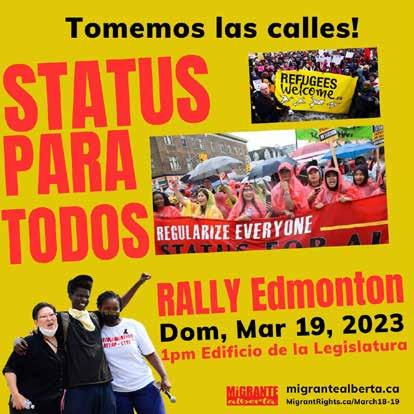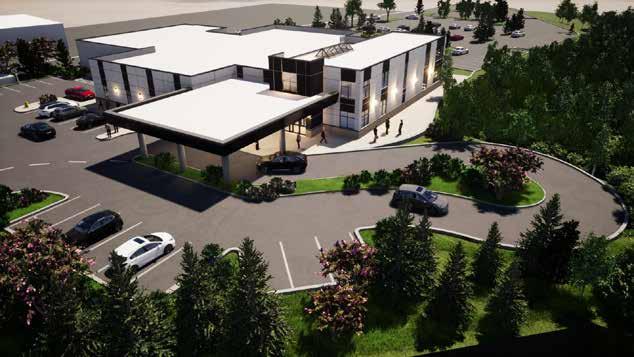
4 minute read
A Growing Support to Regularize
MIGRANTS' VOICES
Marco
Advertisement
With the growing support for regularization of the status of undocumented migrants, we are preparing for another national rally that will be held across Canada. On March 18 and 19, thousands of migrants and supporters will rally in Edmonton, Montreal, Sudbury, Toronto, Vancouver, and Niagara to call on Prime Minister Trudeau to ensure the permanent residence of all migrants and refugees, including the undocumented, as promised in December 2021.
More than 1.7 million migrants grow food, take care of children, people with disabilities and the elderly, and are essential to communities, but they are denied rights because they do not have permanent resident status. They are also some of the hardest hit by the crisis. A regularization programme that grants permanent residence to undocumented persons will give them tools to protect themselves from abuse, ensure gender justice, unify families, and correct historical mistakes. With only a few weeks left until parliament rises for the summer, any delay will continue to exploit hundreds of thousands of people that have no status.
The organization Migrants’ Rights Network (MRN), a Canadawide alliance of grassroots organization across the country has been lobbying for undocumented migrants’ rights to stay. In their campaign document released in 2021 they said that “People become undocumented because of the failures of immigration policy. There is no access to permanent residency for most low-wage migrants in Canada, and only 60% of refugee claimants are accepted. Almost all undocumented immigrants in Canada were previously on a temporary authorization (work, study, refugee claimant permit). They reached a point where they could not get permanent residency and the federal government refused to renew their permits. They were faced with an impossible choice: either return to a country where they may face war, discrimination, climate catastrophe or no economic opportunities and leave communities, families and relationships in Canada OR stay without access to any rights and services and in daily fear of deportation. Those who stay become undocumented immigrants.”
Without permanent residence, people without a legal document cannot claim their work rights or access basic medical services. They face discrimination and exploitation because of a legitimate fear of deportation. Non-status persons are part of the community. Without permanent resident status, they suffer from unsafe housing, abuse at work, poverty, and fear. Uncertainty about the future, the constant pressure to meet the needs of the population and the risks of detention and expulsion have a negative impact on their health. Life without status requires a lot of resilience.
In 2007, the RCMP estimated that Canada had between 200,000 and 500,000 undocumented people. Since then, no new analysis has been carried out, but Canadian temporary work permits have increased at least four times and the number of undocumented people is likely to increase accordingly. An anecdotal information figure says that there are at least 500,000 undocumented migrants in Canada.
The broad support to the organization and the regularization campaign came from almost every major civil society, labour, health, and environmental organization. They have joined our call for full and permanent immigration status for all—nearly 500 organizations. Major organizations from across Canada have also written letters to PM Trudeau supporting our regularization proposal.
According to MRN, the benefits of a comprehensive and inclusive regularization program are:
1. Addressing a historic wrong: A comprehensive program would ensure that Prime Minister Trudeau is remembered for creating life-altering public policy, which corrects a historic wrong. A fair society with equal rights is only possible if everyone has the same immigration status.
2. Part of ending systemic racism and ensuring gender equality: Undocumented people are mostly racialized, low-waged people, often women. Ensuring rights and access for them is part of implementing anti-racist policy and gender equality.

3. Ensure improved labour conditions: Employers of undocumented workers threaten them with deportations to stop them from asserting their rights. This abuse results in overall worsening of working conditions in the labour market. While bad employers prosper, good employers who may be unable or unwilling to hire workers informally or for cash payments are excluded.
4. Ensure public health: Undocumented migrants often do not access healthcare until it is necessary due to the costs. By the time they do, their health conditions are much more complicated, and the burden on the healthcare system is much higher. Regularization will protect overall public health.
5. Create more effective social policy: Currently, there are no reliable statistics on undocumented people in Canada. An inclusive regularization program will ensure that non-status people enter everyday life, allowing for more informed and effective social policy to be created.
6. Grow the economy at greater rates than cost of processing or settlement services: Most non-status people pay taxes but their employers, many of whom are very profitable businesses, do not pay statutory remittances. Regularizing 500,000 undocumented people will increase employer CPP and EI contributions by at least $1.1 billion, just in the first year. As undocumented people achieve stability through permanent residence, they will lay down roots, purchase assets of greater value, and spend more.
7. Create labour mobility to address shortages where they exist: Undocumented people live and work here. Many are in cash-based jobs or are under or unemployed. Regularizing all undocumented migrants will increase their labour mobility, unlocking their skills and experience enabling them to move and take on whichever jobs have openings.

8. Build on best practices around the world: Between 1996 and 2008, 24 of the 27 EU Member States implemented regularization programs, and some several times. An estimated 5.5 to 6 million people were regularized in that time. The largest programs were the Italian 2002 program that regularized 634,000 people and the Spanish 2005 program that regularized 578,375 people. Ireland regularized almost all undocumented people in the country this year who met a basic residency requirement.
In Edmonton, the rally will be held on March 19, at 1:00 PM at the Alberta Legislature Grounds








